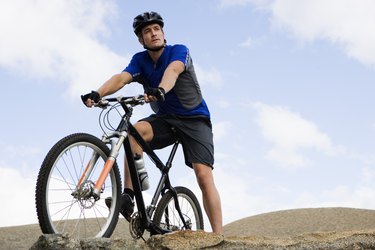
If you're interested in cycling as a workout, your body is in for some major benefits. Cycling — whether outdoors on a bicycle or indoors on a stationary bike — burns lots of calories and helps improve muscular and cardiovascular endurance. It also targets several major muscle groups in powerful ways.
"Cycling is an excellent low-impact cardiovascular workout," says Dari Kruse, the director of education for the National Exercise Trainers Association. "Cycling also tones and strengthens the muscles of the legs and hips, especially when a full-pedal stroke (push and pull) is practiced."
Video of the Day
Video of the Day
If you can familiarize yourself with the muscles cycling builds and integrate exercises for them into your workouts, you'll become stronger during your rides.
Tip
Cycling — either outdoors or on a stationary bike inside — builds your hamstrings, quads and calves and can also tone your calves and strengthen your core.
Read more: The 10 Best Stretches to Do Before Biking
Is Cycling a Good Core Workout?
Well, yes and no. "Proper cycling form does require full engagement of the core, considering the forward lean of an individual on the bike," says Kruse. Your core muscles are also used to power your turns and help you control the bike, especially if you're riding on a more challenging terrain.
But if you're looking to truly target your abs, you may want to add a few more core exercises to your routine off the bike. "Riders can further increase their core strength, and thus their cycling form, by complementing their rides with additional core exercises off of the bike," says Kruse.
The forearm plank, mountain climbers and glute bridge are examples of exercises that strengthen the core muscles even more effectively. Even a set of basic crunches after your ride or on alternate days will also help tone your midsection.
Tip
Your core muscles are what keep your back straight and balanced during your ride. You should be able to hold onto the handle bars and lean forward 45 degrees. Raise the handle bars if you're leaning too far forward to reach them.
Biking Works Your Hamstrings and Quads
Cycling provides a great workout for the hamstrings (the back of the thighs), and the quadriceps (the front of the legs). Together, the muscles work in conjunction to power your pedaling, so you really don't need to add anything extra to make sure you're targeting all three areas of your legs.
"The best way to target each specific muscle group of the legs is to implement a full-pedal stroke, meaning the motion is circular (think cyclic rather than piston)," says Kruse. "The quadriceps provide most of the effort to push the pedal down. The hamstrings pull on the upstroke and can especially be targeted when adding resistance to the bike or simulating a hill."
Strengthening both the hamstrings and the quads will help ensure muscular balance, promoting cycling efficiency and reducing the potential of injury.
It Also Works Your Calves
The soleus and the gastrocnemius — or the calf muscles — also help you pedal. Cycling makes them stronger, and additional strength training provides multiple benefits.
Strong calves will make it easier to pedal for a longer duration, and they'll help prevent cycling injuries, such as shin splints. Examples of calf exercises you can do off your bike to further strengthen them include ankle flexion and standing calf raises.
Cycling Can Even Tone Your Glutes
Don't overlook the potential for shaping your glutes while cycling. Every time you stand up and cycle, your glutes help power the movement. Increase the intensity — either on an indoor cycling bike or by biking up a hill outdoors — and you'll up the ante for your backside.
"One of the best ways to ensure that the glutes are working is to start with a proper bike fit," says Emily Booth, the education manager for cycle at Life Time fitness centers. "Having the seat at the right height, which is often a little higher than most people think, ensures that the hip can go through a greater range of motion and engage more of the glutes."
Exercises that will help strengthen your glutes, therefore increasing your cycling potential, include walking lunges, dumbbell step-ups and body-weight squats.
- Fitness: Ride On: Everything You Need to Know About Bicycling and Spinning
- Fitness: Ride On: A Fitness Reader Learns How to Ride a Bike
- Exploratorium: Science of Cycling: Muscles Used For Cycling
- American Council on Exercise: Glute Bridge
- American Council on Exercise: Front Plank
- American Council on Exercise: Mountain Climbers
- American Council on Exercise: Bodyweight Squat
- American Council on Exercise: Forward Lunge
- American Council on Exercise: Ankle Flexion
- American Council on Exercise: Standing Calf Raises
- American Council on Exercise: Dumbbell Step-up